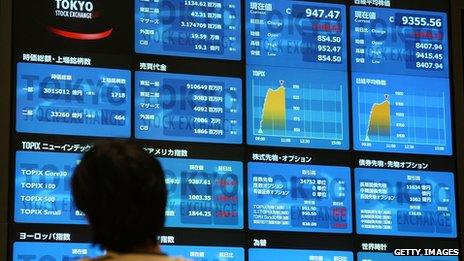Japan's Nikkei index hits six-year high
- Published

Investor morale has been boosted by hopes of an economic recovery in Japan
Japan's main stock index has closed at its highest level for nearly six years, tracking overnight gains on Wall Street and buoyed by a weak yen.
The Nikkei 225 rose 1.8% to 15,727.12 points, the highest level since December 2007.
The index has surged nearly 50% this year after a series of aggressive moves by policymakers to help boost growth.
The measures have resulted in a fall in the yen's value, lifting exports and boosting profits of exporters.
The Japanese currency has dipped nearly 25% against the US dollar since the start of this year.
That makes Japanese goods more affordable for foreign buyers and boosts profits of exporters when they repatriate their foreign earnings back home.
"There has been risk-taking momentum due to several positive factors, including the yen's decline below 102 against the US dollar," said Kenzaburo Suwa, a strategist with Okasan Securities.
"It would not be a surprise to see the Nikkei top 16,000," he added.
Earlier this month, figures showed that economic growth in the country slowed to 0.5% during the July-to-September period, down from 0.9% in the previous quarter.
Continued recovery?
However, policymakers have said that Japan's recovery remains on track despite the slowdown, not least because of the aggressive moves announced over the past year.
Prime Minister Shinzo Abe, who came to power last year, has unveiled a series of measures based on the so-called "three arrows" - monetary policy, fiscal stimulus and structural reforms.
The first arrow, monetary policy, is aimed at ending Japan's almost two decades of falling prices, or deflation.
The measures have already started to make an impact. Consumer prices in Japan have now risen for four months in a row.
Earlier this month, Japan's central bank said it had no intention to reduce its asset-buying scheme - launched in April and also aimed at reviving the country's economy - which has further boosted investor morale.
The bank is buying bonds worth up to 70 trillion yen ($700bn; £435bn) a year.
The second arrow has seen Mr Abe announce plans to boost government spending on infrastructure to foster growth.
And the third arrow - reforms in key sectors - is aimed at encouraging private investment in the country.
Though any substantial reforms are yet to be announced, Japan has made some move in this area, such as joining the Trans Pacific Partnership (TPP) trade talks.
The TPP is a free trade agreement currently being negotiated among 12 countries.
The trade pact is expected to lead to big reductions in tariffs on goods and services between member countries, boosting trade between them and helping their economies.
- Published20 November 2013
- Published20 November 2013
- Published19 November 2013
- Published14 November 2013